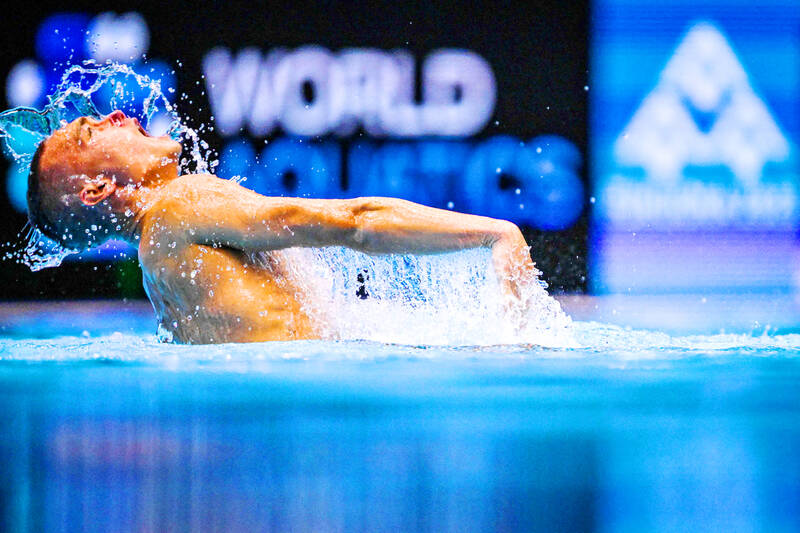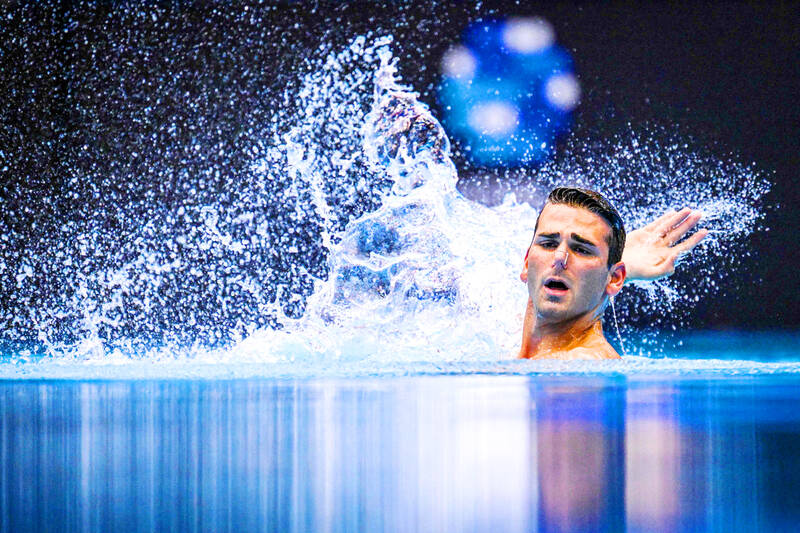Snicker if you wish. Guffaw for good measure. Bill May and other male synchronized swimmers — now called artistic swimmers — have heard the putdowns before, but they are getting the last laugh.
Men have competed in synchro at the lower levels for decades. Now they are being included in the Olympics, meaning next year’s Summer Games in Paris.
“I think it’s a huge opportunity for the sport to grow and attract more men,” May said at the World Aquatics Championships. “By keeping men out you’re limiting the sport. By including men you’re going to see an upshift in the popularity and the numbers.”

Photo: AFP
May looks like a lean bodybuilder. He was among the first men to compete when synchro was included in the worlds for the first time in 2015. He worked for 17 years at Cirque du Soleil doing water-themed shows. He has come out of competitive retirement for a chance to compete at the Olympics.
“There has always been that misconception that it’s a female-only sport, or that it’s for wimps, or that it’s not a difficult sport,” the 44-year-old May said. “Anyone that has anything negative to say about the sport — boy, female, anyone. Just try it and you’ll know it’s the most difficult sport in the world.”
This is not the synchronized swimming that your parents or grandparents watched — the water ballet that made few waves below the flowery rubber caps and permanent smiles. It is estranged from the sport introduced at the 1984 Los Angeles Olympics.

Photo: AFP
The acrobatic team event, in particular, features lifts, throws and flips, and diving routines launched off the shoulders of teammates treading water below. It is gymnastics on water and concussions are a risk.
Interested men often confront the stereotypes.
Beginning in elementary school, 18-year-old American Kenny Gaudet dreamed of being a synchronized swimmer. He made it, but it was not easy.
“It makes me emotional just to think about the problems we all went through and the struggles we all had just to get a chance to swim and do what we love,” said Gaudet, who competed at this year’s worlds.
“So much bullying. So much slander. So much hate,” he added. “Just because of my gender, just because I’m a male in artistic swimming. When I first started I wanted to quit so many times. Growing up my peers would ask why I’m doing a female sport, why am I being like a girl and degrade me for doing what I love to do.”
One aspect of Adam Andrasko’s job as the head of USA Artistic Swimming is recruiting men. He said there are about 100 participating in the US, up from 25 just four years ago.
“There hasn’t been a good foundation of growth,” Andrasko said. “You haven’t had the farm system.”
A few countries at the world championships have male swimmers including the US, Japan, Germany and China. Spain and Italy also have top competitors.
“There aren’t a lot of countries with strong males” in the international competition, Andrasko said, adding that men often lack the flexibility to compete. “So you might not see a lot of males swimming in the Olympics. I’m concerned it goes to the Olympic Games and we don’t see a male participating. I definitely have that fear.”
“To this point, women are still far better at this sport than a man,” he added.
Another fear, apparently unfounded, is that women might resent the men competing in the sport. Men are to compete in only team events at the Olympics.
Teams have a maximum of eight members — with a limit of two men — which means men might crowd out some women.
There is no requirement for men to be included.
Asked about any acrimony, two-time American Olympian Anita Alvarez said: “No, not at all.”
Alvarez has blacked out twice in the past two years while competing and had to be resuscitated. She has been cleared to compete with no diagnosis except physical or mental exhaustion. Holding her breath for too long underwater is also suspected.
“Having the inclusion of both males and females will make it more open for young boys and young girls to dream of being in the Olympics, parents wanting to start their kids,” Alvarez said.
She ran off her workout routine, sure to scare away men and women equally.
“We’re training eight-plus hours a day, treading water all day,” she said. “You have to be able to count time and work with music. You have to be able to watch your patterns and stay in line. We don’t wear goggles when we compete. You’re holding your breath. You don’t touch the bottom. There are so many elements that go into it that people don’t see.”

Hong Kong-based cricket team Hung See this weekend found success in their matches in Taiwan, even if none of the results went their way. Hung See played the Chairman’s XI on Saturday morning, the Daredevils that afternoon and PCCT yesterday, with all three home teams winning. The team for Chinese players at the Happy Valley-based Craigengower Cricket Club sends teams on tour to “spread the game of cricket.” This weekend was Hung See’s second trip to Taiwan after visiting Tainan in 2016. “The club has been traveling to all parts of the world since 1982 and the annual tradition continues [with the Taiwan

Taiwan’s Hsieh Su-wei yesterday advanced to the semi-finals of the women’s doubles at the Australian Open, while Coco Gauff’s dreams of a first women’s singles title in Melbourne were crushed in the quarter-finals by Paula Badosa. World No. 2 Alexander Zverev was ruffled by a stray feather in his men’s singles quarter-final, but he refocused to beat 12th seed Tommy Paul and reach the semi-finals. Third seeds Hsieh and Jelena Ostapenko of Latvia defeated Elena-Gabriela Ruse of Romania and Marta Kostyuk of Ukraine 6-2, 5-7, 7-5 in 2 hours, 20 minutes to advance the semi-finals. Hsieh and Ostapenko converted eight of 14 break

The San Francisco Giants signed 18-year-old Taiwanese pitcher Yang Nien-hsi (陽念希) to a contract worth a total of US$500,000 (NT $16.39 million). At a press event in Taipei on Wednesday, Jan. 22, the Giants’ Pacific Rim Area scout Evan Hsueh (薛奕煌) presented Yang with a Giants jersey to celebrate the signing. The deal consisted of a contract worth US$450,000 plus a US$50,000 scholarship bonus. Yang, who stands at 188 centimeters tall and weighs 85 kilograms, is of Indigenous Amis descent. With his fastest pitch clocking in at 150 kilometers per hour, Yang had been on Hsueh’s radar since playing in the HuaNan Cup

HARD TO SAY GOODBYE: After Coco Gauff dispatched Belinda Bencic in the fourth round, she wrote ‘RIP TikTok USA’ and drew a broken heart on a television camera lens Defending champion Hsieh Su-wei of Taiwan yesterday advanced to the quarter-finals of the women’s doubles at the Australian Open, while compatriot Chan Hao-ching on Saturday dominated her opponents in the second round, as world No. 1 Aryna Sabalenka swept into the quarter-finals. Third seeds Hsieh and Jelena Ostapenko of Latvia toppled Hungary’s Timea Babos and Nicole Melichar-Martinez of the US 6-4, 6-3, hitting 24 winners and converting three of seven break points in 1 hour, 18 minutes at 1573 Arena. Although rivals at last year’s Australian Open — where Hsieh and Belgium’s Elise Mertens beat Ostapenko and Ukraine’s Lyudmyla Kichenok 6-1, 7-5